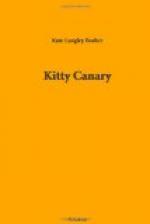I took him down Princess Street first, of course, and showed him the bank and post-office and moving-picture places, and the court-house and churches and stores, and specially the drug-store, which is a sort of standing-up club for the men; and I told him whose were the offices; and Whythe came out of his and spoke to him in a perfectly perfect way, and said he hoped he would be permitted to show him some of the things of interest in the neighborhood. And also he said if it was convenient to us he would call in a car (Whythe hasn’t even a Ford, but he has a Twin-Six manner) in the morning and we would drive to Horseshoe Falls, and from there go on to Spruce Mountain, where something historic happened during the Revolution, I think; and only once when talking did he look right in my eyes. His sent a message, and my heart flopped around so it felt like a frog in a can of milk, and, I was so afraid Father would hear, I told Whythe we would go with pleasure and were much obliged, but we couldn’t stop any longer, as there was a good deal to see before dinner. He shook hands twice with Father, who, when he was out of hearing, asked me how a young man could leave his business in the morning and go riding. I told him business could always be left in Twickenham Town, and he laughed and said he wished he lived in a town of that sort. I wish he did.
We stopped just a minute to speak to Mr. Bugg, who sells vegetables and eggs and things, and whose wife has just had twins again, and this time has a milk-leg also, and Father shook hands with him and asked about the babies, I thinking just in time to tell him to do it, and then we had some soda-water at Mrs. Grump’s. It is the most awful soda-water in the world, Mrs. Grump’s is, but it is wet and cold, and you can sit down when drinking it, and while we sat she touched up the town and Father nearly fell out of his chair at the way she did it. If Mrs. Grump were for sale, I’d sell everything I own to get enough to buy her, for the way she can put into words what she thinks of human beings would make a graven image come to life. She never smiles herself.
After we got through with Princess Street we turned in by Colonel Rixby’s and then went down by the Baconses’ and into The Court, whose trees were planted by order of some lordly person, kin to the Aikens who have been sitting under the shade of their greatness ever since, and then we strolled by the Eppes house, for I wanted Father to see it. It is the stateliest old place in town and its garden of old-fashioned flowers makes one think the twentieth century is a mistake and ought never to have been, but ordinarily I pass it quickly, as I don’t care for its owners. The house has perfect lines and the dearest little panes of glass in its deep, wide windows; and inside it has big fireplaces and beautifully carved woodwork and wonderful old furniture and fearful old portraits, and I certainly wanted Father to see everything in it, but I didn’t expect him to do it, for the House of Eppes doesn’t admire me any more than I admire it—and then the unexpected happened.




